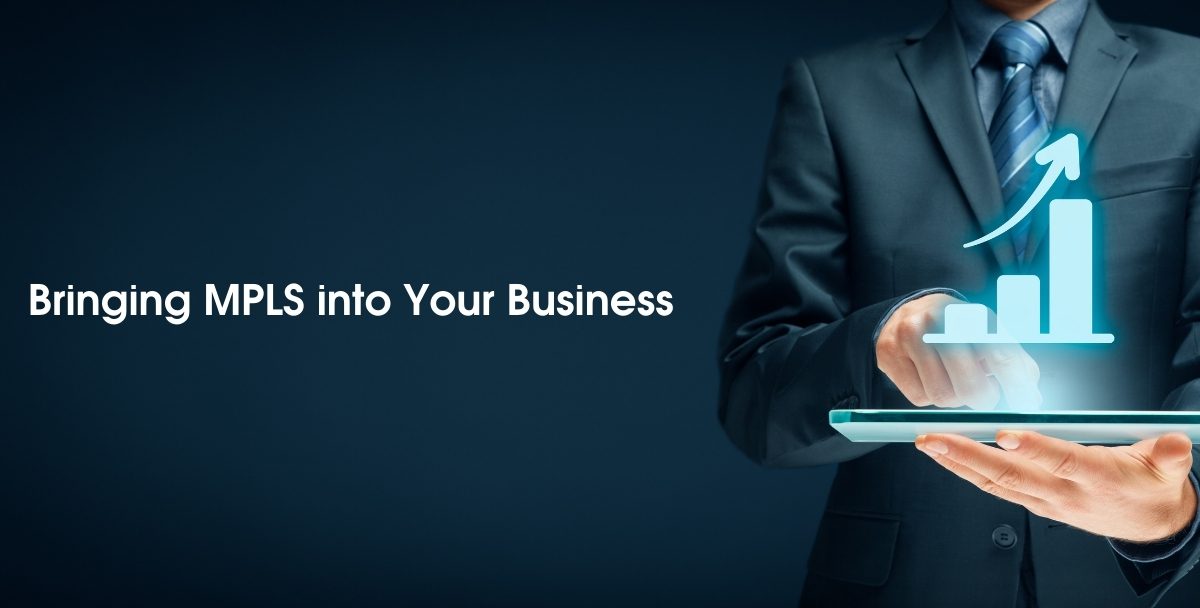Bringing MPLS into Your Business

If you’re reaching the limits of what your business IT network can give to your business, it could be time to consider MPLS.
MPLS is a sophisticated network data management tool that can bring better speed, better reliability, and improve efficiency across your infrastructure – but without understanding a little more about the technology, it can be difficult to decide whether or not it’s a sound investment for your business.
Here, we’ll take a deeper dive into what MPLS is, how it works, some of the benefits you might experience, and how to make sure you’re getting solution provider that meets your needs.
What is MPLS?
MPLS stands for ‘Multi-Protocol Label Switching’ – and the name of the technology helps you work towards a solid definition.
The tech is referred to as ‘multi-protocol’ simply because it works with virtually all protocols – or networking languages. In terms of a ‘label’ – that’s a tiny piece of data that’s added to data that currently flows around your network. When tagged with this label, an LSR (label switch router) can identify data quickly, and direct it through preconfigured or dynamically changing routes – making sure data is delivered as quickly as possible and without interference.
In effect, this gives your whole network a manifest from which it was organise itself. Rather than throwing masses of data through the system and hoping for the best when it comes to bandwidth and throughput, MPLS makes it more of an exact science.
What are some MPLS benefits?
With a rough understanding of how MPLS works, it’s worth thinking about how MPLS features could benefit a business.
Better network speed
Business networks are rarely lacking on data crossing them – so it’s common for congestion to occur as limited connections struggle with endless data. With an MPLS system, you can give different routes to different types of data created by users and/or applications – and in doing so, you make sure that data doesn’t get caught in rush hour traffic.
Simplifying your infrastructure
In a lot of ways, it’s useful to consider having an MPLS-enhanced connection between two devices not dissimilar to have a long cable run between the two devices. Of course, there’s more to the setup that this – but the end result is close to being the same; a dedicated connection that isn’t caught up in the complexity of the overall network. When it comes to working on your network, IT professionals will benefit from a better and quicker understanding of the routes that traffic is taking.
A better user experience
Today more than ever before, the applications we use are stored centrally. We don’t really even refer to them as ‘cloud-based’ anymore – it’s now just the given norm that we work from applications that are stored centrally and connected using the internet. While this is beneficial in many ways, it does mean that the end user tasks associated with this type of working become incredibly sensitive to speed issues. With MPLS, you can make sure that these applications’ data is always free flowing – meaning your end users can work without any performance limitations.
Additional uptime
When it becomes simpler for IT network engineers to identify and fix problems across your network, the amount of time that your applications (and therefore users) spend off-line is reduced. Downtime costs companies serious amount of money – so if it can be reduced, it’s almost certainly going to have a positive effect on how your business runs.
Increased efficiency
MPLS lets you dynamically handle your data – so, even with a carefully considered roadmap that your data can follow, unexpected issues can be quickly worked around. The system will be constantly monitoring your network for unused bandwidth – and, should pre-configured routes slow down, this additional bandwidth can be employed to keep things running smoothly. This is especially useful if you experience sudden strains as different offices/shifts come online, momentarily swelling data and potentially slowing your end-user or customer experience.
Is MPLS right for you?
Whether or not MPLS is going to suit your company and your overall business plans boils down to a few questions.
- Do you have different types of network data all using the same connections?
- Do you ever experience congestion across your network (especially that which hinders your processes)?
- Do you have a voice and data requirement?
- Is uptime a crucial factor when it comes to your bottom line?
If the answer to one or all of those things is yes, then MPLS could be a step in the right direction.
Finding the right MPLS provider
So, if MPLS seems like it could be a good fit for your organisation, how do you find a company who can help you create a system that’s perfect for your requirements?
For most companies – the key is in that exact question; how do you find a company who can help you create a system that’s perfect for your requirements? There are plenty of companies out there who will help you implement an off-the-peg solution that may offer some benefit – but the very best managed service providers will be the ones who spend time with you and your business to work out exactly what you need from an MPLS system.
A good provider will spend time with you to look at your processes and end user experiencers – while considering how all this fits into the bigger infrastructure picture. Of course, they’ll also consider how much time you’ve got before you need to be up and running. Naturally, all this has to sit against a backdrop of being a company that’s easy to communicate and work with too.
It’s a big ask – but there are companies out there that can deliver this experience. The best way to find them? Well, it’s not a bad idea to talk to other companies you know that have had MPLS installed. If they’ve had a great experience, talking to the same company could be the first step in finding an MPLS solution that helps you drive your business forward.





